Restorative Dentistry
 Restorative Dentistry in West Bend
Restorative Dentistry in West Bend
Restorative dentistry includes any procedure performed to restore the function and appearance of the teeth and smile. Restorative dentistry refers to treatments that correct existing problems or repair dental damage, such as:
- Dental fillings to fill in cavities
- Crowns and dental bonding to repair damaged, cracked, or broken teeth
- Dental implants to replace missing teeth
- Prosthetic devices such as bridges and dentures to restore the healthy function and appearance of your smile
Dr. Harding uses a wide range of treatments, techniques, and materials to expertly repair damaged, cracked, broken, and/or missing teeth. These treatments impart healthy function, while also creating a balanced and symmetrical smile.
Conditions Restorative Dentistry Corrects
Restorative dentistry corrects a wide variety of problems, ranging from simply filling in cavities to repairing, covering, or replacing damaged and missing teeth. Restorative work may include placing a crown on a tooth that has been weakened or damaged by a root canal procedure to strengthen and stabilize the tooth. A bridge to replace missing teeth to correct the bite and restore healthy chewing ability is another type of restorative procedure.
Knowing when to seek restorative dental care
If your teeth are damaged in any way, as a result of injury or disease, Dr. Harding can restore your teeth’s strength and beauty, as well as the healthy natural function of your mouth. When you come in for an appointment with Dr. Harding, he will let you know what your options are for repairing, restoring, or replacing any teeth in your mouth that have been damaged or lost.
Restorative dentistry and dental insurance
In many cases, restorative procedures may be covered by your dental health insurance plan, but the best way to determine this is to call your carrier and ask about specific coverage for restorative procedures. If you should require any work that is not covered by your dental insurance plan, Dentistry of West Bend is happy to help you find suitable payment plans to pay for your restorative procedures.
Is restorative dental work painful?
It all depends on the procedure. In some cases, a restoration procedure may require drilling a tooth to fill a cavity or to alter its shape, or you may need to have titanium implants surgically attached to your jaw bone. While these procedures may produce some discomfort, we go to great lengths to make sure that you do not experience any discomfort during any procedure.
Dr. Harding is proud to provide excellent care with a very gentle touch, and we provide several types of pain medication, including injections, topical anesthetics, and/or nitrous oxide to prevent any potential discomfort during any procedure. Once the anesthesia wears off, you may experience some soreness, but we can prescribe adequate pain medication to alleviate that.
Restorative FAQs
Dr. Jared J. Harding, DDS, and our West Bend dental team offer restorative dentistry that not only supports your smile’s appearance but restores its healthy function. Here are some common questions and straightforward answers to help you understand your options.
How can restorative dentistry help with oral health issues?
Restorative dentistry repairs or replaces teeth that are damaged, decayed, or missing. Whether it’s a filling for a cavity, a dental crown for a cracked tooth, or an implant to replace a missing tooth, these treatments restore chewing ability, protect remaining teeth, and help maintain the integrity of your bite.
Can children receive restorative dental treatments?
Yes. Restorative treatments are not limited to adults. When cavities, chipped teeth, or other issues arise in children, the same goals apply – restore healthy function and prevent more serious problems later.
Is it safe to get multiple restorations at once?
Yes—under the guidance of Dr. Harding and our team, it’s both safe and efficient to receive multiple restorations in one appointment if that makes sense for your situation. We tailor the care to your comfort, ensure local anesthetics or sedation as needed, and monitor everything closely. This approach can reduce overall visits and help restore your oral health more quickly.
What are my options if I have a cavity?
A cavity can be treated with a tooth-colored composite filling, an inlay or onlay if the damage is larger, or a crown if the tooth is significantly weakened.
Can chipped teeth be restored?
Absolutely. Whether the chip is minor or more significant, we offer solutions such as dental bonding, veneers, or crowns, depending on the extent of the damage and your cosmetic goals.
How do I know if I'm a candidate for dental implants?
A strong candidate for a dental implant has good overall health, sufficient jawbone density, and healthy gums. During a consultation, Dr. Harding will evaluate your specific case—including missing teeth, spacing, bone health, and overall oral condition—and guide you through whether implants are right for you, or whether alternatives like bridges or dentures would be a better fit.
How does a denture differ from a partial?
A full denture replaces all teeth in an arch (upper or lower). In contrast, a partial denture fills in where only some teeth are missing, using the remaining teeth for support. Both restore function and appearance, but your ideal option depends on how many teeth are missing and which ones, your jawbone condition, and your personal goals.
If you’re ready to restore your smile’s health and function, call us at (262)-334-0316 to schedule your consultation. At Dentistry of West Bend, we’re committed to delivering gentle, personalized care every step of the way.

 Restorative Dentistry in West Bend
Restorative Dentistry in West Bend